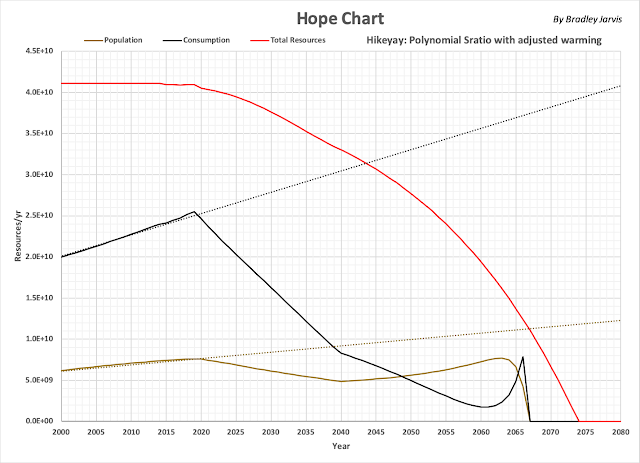Last night, Maura asked me a simple question that became the subject of a meeting today with the leadership of Possibilities from Responsibilities: “Have you considered what to do if the external impacts can’t be stopped in 2040?” That year is the “end state” that we’ve all been planning on, where everything levels off after a 21-year decline.
I recalled the version of the Hope Chart showing the alternative scenario she referred to, where population begins to grow again and consumption drops at a slower pace. “We’ll go along with everyone else, and minimize the pain to buy more time,” I answered her, suddenly feeling lame.
She gave me a look of pity that I’ll never forget. “There won’t be enough resources left to buy more time, Will. The pain will get worse for another 27 years, and then everyone will be dead.”
“That’s not going to happen,” I said, and then regretted it. In the three months that we’ve known each other, there have been over a half-dozen conversations about the hubris behind technology, and I didn’t want this to be another one. “We don’t know what’s really going to happen,” I corrected myself.
“That’s true,” she conceded, “though Sally says the uncertainty’s now less than five percent that it won’t get worse.” If anyone knew, it would be Sally the AI.
“What’s the trigger? What’s so special about 2040?” I remembered what it used to be, but she might have new information.
She played along. “It’s an inflection point, a sudden transition. Because of increasing age, if people don’t start having more children then they won’t be able to keep the population from going extinct. Also, per-capita consumption will be right at the edge of keeping a global civilization functioning. If it drops further, then we can’t organize our response or maintain technology that can have a substantial effect.”
I decided to ask her something I had no clue about, mainly because it never became part of the strategy. “What happens if we try to keep everything level anyway?”
“Consumption would have to drop to zero, with the obvious result.” Translation: everyone dies.
When I brought up the subject with the PFR leadership, Louis Delambre told me they were planning to add basic needs training to the next iteration of its Possibilities Bootcamp. “We’re offering it as a way to free up resources to deal with emergencies, something we had to do a few times in the test communities.”
When I said I would be writing about this, Louis and the rest of the leadership agreed that it should be advertised as necessary preparation for if nothing else is possible.
Reality Check
There are actually three non-trivial inflection points (using the geometric definition), obvious on the following graphs: in 2019, 2040, and 2062. The period discussed by Will and Maura is from 2040 to 2067. The characterization of what happens is drawn from the simulation.



No comments:
Post a Comment